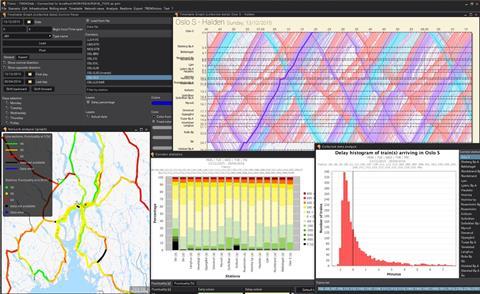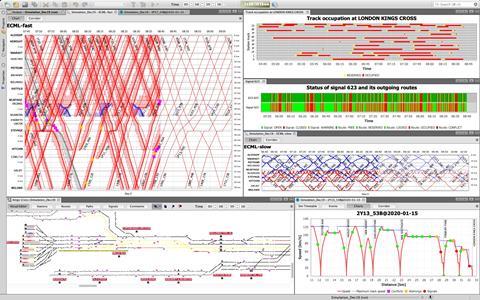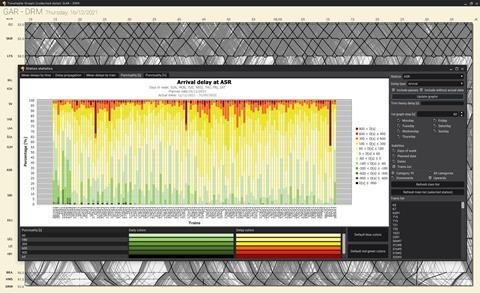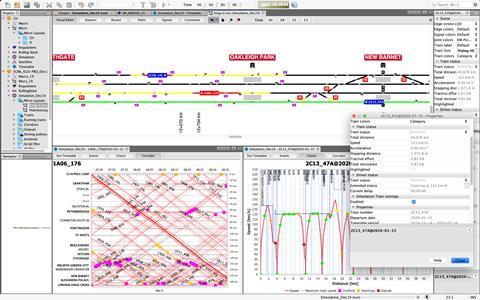
INTERNATIONAL: A joint venture offering sophisticated timetable planning and optimisation services to ensure proposals are workable and robust has been formed by specialist Italian software and consultancy firm Trenolab and MTR Group’s British subsidiary.
Graham Cross, Commercial Director of MTR UK, said Trenolab is ‘a company with whom we have a longstanding relationship and a great deal of admiration’, and ‘we have seen first-hand the power their software brings to the rail sector when important decisions on timetable and infrastructure specification need to be made’.
MTR brings its practical knowledge of day-to-day rail operations to the joint venture, and ‘together we aim to help clients drive significant improvements in punctuality and reliability across their operations, to benefit their passengers and freight customers’.
The joint venture is based in the UK, but the technology is applicable internationally and Trenolab has undertaken projects Italy, Paris, Norway and elsewhere.
Doing it better

Trenolab was founded in 2015 by Giorgio Medeossi, who used other software while undertaking a PhD in train planning at the University of Trieste where he realised ‘we could develop something better ourselves’.
He is now Technical Director of the company, which has 20 employees and has three platforms: TrenoAnalysis for traffic data analysis, TrenoPlus for timetable planning and Trenissimo for fast simulation of all train services over large areas.
Medeossi says Trenolab’s strength comes from combining software development with consultancy, enabling it to identify the best tools for efficiently solving a client’s problems while also being able to develop new functions when necessary.
Trenolab has reduced the time taken to run a full timetable simulation of a network such as London’s Elizabeth Line and Great Western services from 14 h to simulate 30 days of operations in 2016 to 1½ h for 250 days — equivalent to a year of weekdays — today. This speed enables full simulations to be undertaken for regular timetable updates as well as for major projects.
Trenolab uses vast quantities of data from real world systems including on-train monitoring equipment and signalling systems, so its models are based on what actually happens rather than merely what is planned.
This highlights issues such as slightly longer dwell times at different times of day or days of the week, the impact of the time needed for a signaller to physically set a route, or an individual train driver’s style — Trenolab notes that the UK’s ‘professional driving’ approach produces different outcomes to train driving styles elsewhere.
Following the pandemic, models were run to assess the effects on dwell times of different numbers of passengers returning to the network.
Elizabeth Line experience

The joint venture follows from Trenolab’s work with MTR UK to plan services for the Elizabeth Line, which MTR operates under contract to Transport for London.
The introduction of Elizabeth Line services was phased to match the late-running completion of the infrastructure. Trenolab’s rapid modelling enabled plans to be revised as dates became firmer, and in doing so it became apparent that that some intermediate phases of the timetable roll-out could be skipped, enabling fuller services to be offered to passengers sooner.
Planning ahead

While Trenolab was not available when the Crossrail project — now the Elizabeth Line — was being designed, future projects will be able to benefit from the ability to undertake more detailed modelling.
Planners can design out potential problems, and make more informed decisions about issues such as how many platforms a station needs or where trains might need to detrain passengers during disruption.
MTR Elizabeth Line Managing Director Mike Bagshaw believes all rail timetables should be modelled in advance now that it is technically possible to do so on reasonable timescales, as this would help to avoid launching a poor timetable on the public or spending money on infrastructure which might not be used optimally.
‘A number of well-intentioned timetable changes have gone wrong’ in the UK in recent years, he said, and this became a major public concern with the ‘debacle’ of the May 2018 timetable change.
At the opposite end of the scale, he believes the industry has at times been too conservative in making changes, fearing that a new timetable might not work. ‘No-one is able to make the trade-offs needed’ on the East Coast Main Line, he said, and in northern England ‘no-one can square the circle of competing stakeholders’.
However, the latest simulation tools allow the operation of proposed timetables to be demonstrated using real-world data, enabling specialist train planners and operators to work with people who understand stakeholder dynamics, and can say ‘if you change that, we can deliver this’, Bagshaw concluded.

















